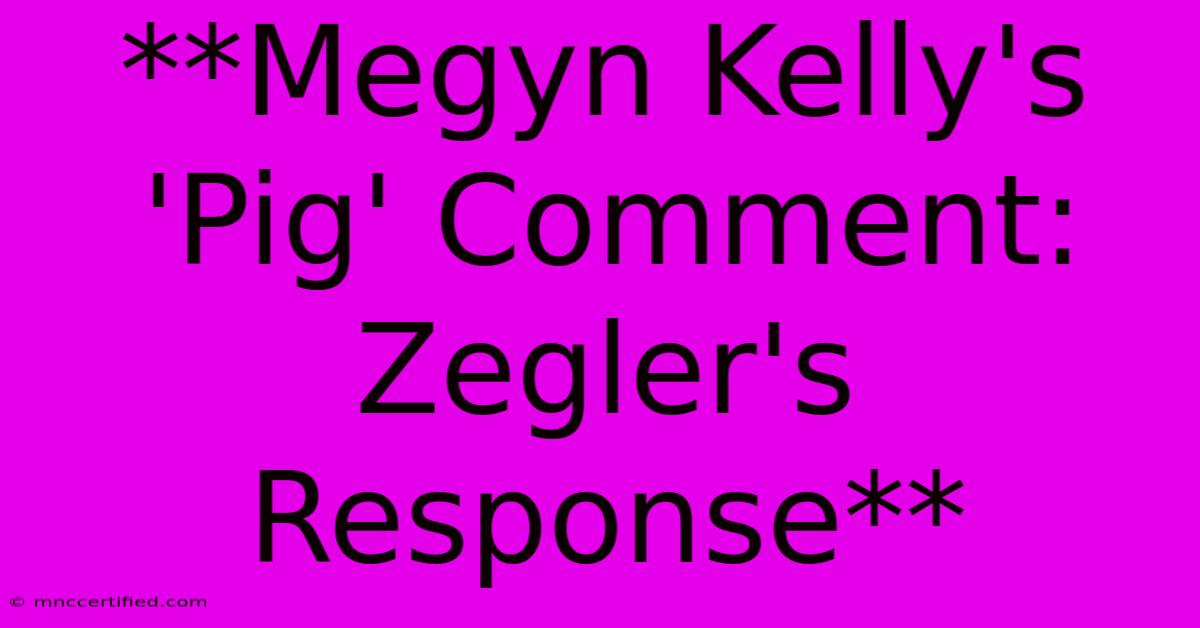**Megyn Kelly's 'Pig' Comment: Zegler's Response**

Table of Contents
Megyn Kelly's 'Pig' Comment: Zegler's Response and the Fallout
The internet exploded after conservative commentator Megyn Kelly labeled Rachel Zegler, the star of Disney's live-action "Snow White," a "pig." This seemingly simple comment ignited a firestorm of debate, highlighting issues of body shaming, ageism, and the often-toxic nature of online discourse. This article will delve into the specifics of Kelly's comment, Zegler's response, and the wider implications of the incident.
The Spark: Kelly's Controversial Remark
Megyn Kelly's comment wasn't delivered subtly. During a broadcast on her podcast, she openly criticized Zegler's appearance, using the word "pig" to describe her physique. This wasn't a passing remark; it was a deliberate statement delivered with a tone that many interpreted as mocking and dismissive. The exact context and the precise phrasing may vary depending on the source, but the core message – a negative and disparaging assessment of Zegler's body – remains consistent. This overt body shaming quickly drew condemnation from various corners of the internet.
The Underlying Issues: Body Shaming and Ageism
Kelly's comment transcended mere criticism. It tapped into the deep-seated issue of body shaming, particularly prevalent in the entertainment industry. The pressure on female celebrities to conform to unrealistic beauty standards is immense, and Kelly's remark reinforced this damaging pressure. Furthermore, some critics pointed out an element of ageism. Zegler, being a young actress, is arguably more vulnerable to such attacks, with her self-image still developing. These intertwined issues fueled the outrage and the rapid spread of the controversy across social media platforms.
Zegler's Response: Grace Under Fire
Zegler's response to Kelly's comment was remarkable. Instead of engaging in a tit-for-tat argument or retaliating with similar negativity, she chose a path of measured dignity and self-assurance. While she didn't explicitly address Kelly's comment directly in a public statement (at least not initially), her continued focus on her work and positive self-image spoke volumes. This measured response arguably made her actions more impactful than a fiery rebuttal might have been. It also highlights a critical approach for handling online abuse: choosing to rise above the negativity.
The Power of Ignoring the Haters (and Amplifying Positivity)
Zegler's actions demonstrate a strategic approach to managing online criticism. By prioritizing her well-being and avoiding a direct confrontation, she demonstrated resilience and avoided further fueling the controversy. Instead, she leveraged her platform to promote positivity and celebrate body diversity. This strategic silence, coupled with a focus on positive content, effectively neutralized Kelly's attempt to dominate the narrative.
The Wider Implications: Online Toxicity and Celebrity Scrutiny
The Kelly-Zegler incident is not an isolated incident. It highlights the pervasive issue of online toxicity and the relentless scrutiny faced by celebrities, particularly women. Social media platforms, while offering opportunities for connection, also serve as breeding grounds for negativity and hate speech. This incident underscores the need for increased moderation and a greater emphasis on fostering respectful online communities.
The Role of Media and Responsibility
The incident also raises questions about the responsibility of media personalities and the impact of their words. Kelly's comment, delivered through a widely accessible platform, demonstrates the power – and potential harm – of public figures’ statements. It is a reminder that words have consequences and that public figures have a responsibility to engage in constructive discourse.
Conclusion: Learning from the Controversy
Megyn Kelly's "pig" comment and Rachel Zegler's response offer valuable lessons. The incident serves as a stark reminder of the pervasiveness of body shaming and online toxicity, while also demonstrating the power of grace, resilience, and focusing on self-love in the face of adversity. Ultimately, the controversy underscores the need for greater online accountability and a more compassionate approach to public discourse. The lasting impact will hopefully be a renewed conversation about responsible online behavior and the creation of safer spaces for public figures and everyone engaging on the internet.

Thank you for visiting our website wich cover about **Megyn Kelly's 'Pig' Comment: Zegler's Response** . We hope the information provided has been useful to you. Feel free to contact us if you have any questions or need further assistance. See you next time and dont miss to bookmark.
Featured Posts
-
Jalen Hurts Funds Philly School Ac
Nov 15, 2024
-
Cynthia Erivo Wicked Dance Details
Nov 15, 2024
-
Hodge Watkins Discuss Cross Alex
Nov 15, 2024
-
Glastonbury Coach Tickets New System Criticized
Nov 15, 2024
-
Drexlers Derrumbe Wins Song Of The Year Award
Nov 15, 2024